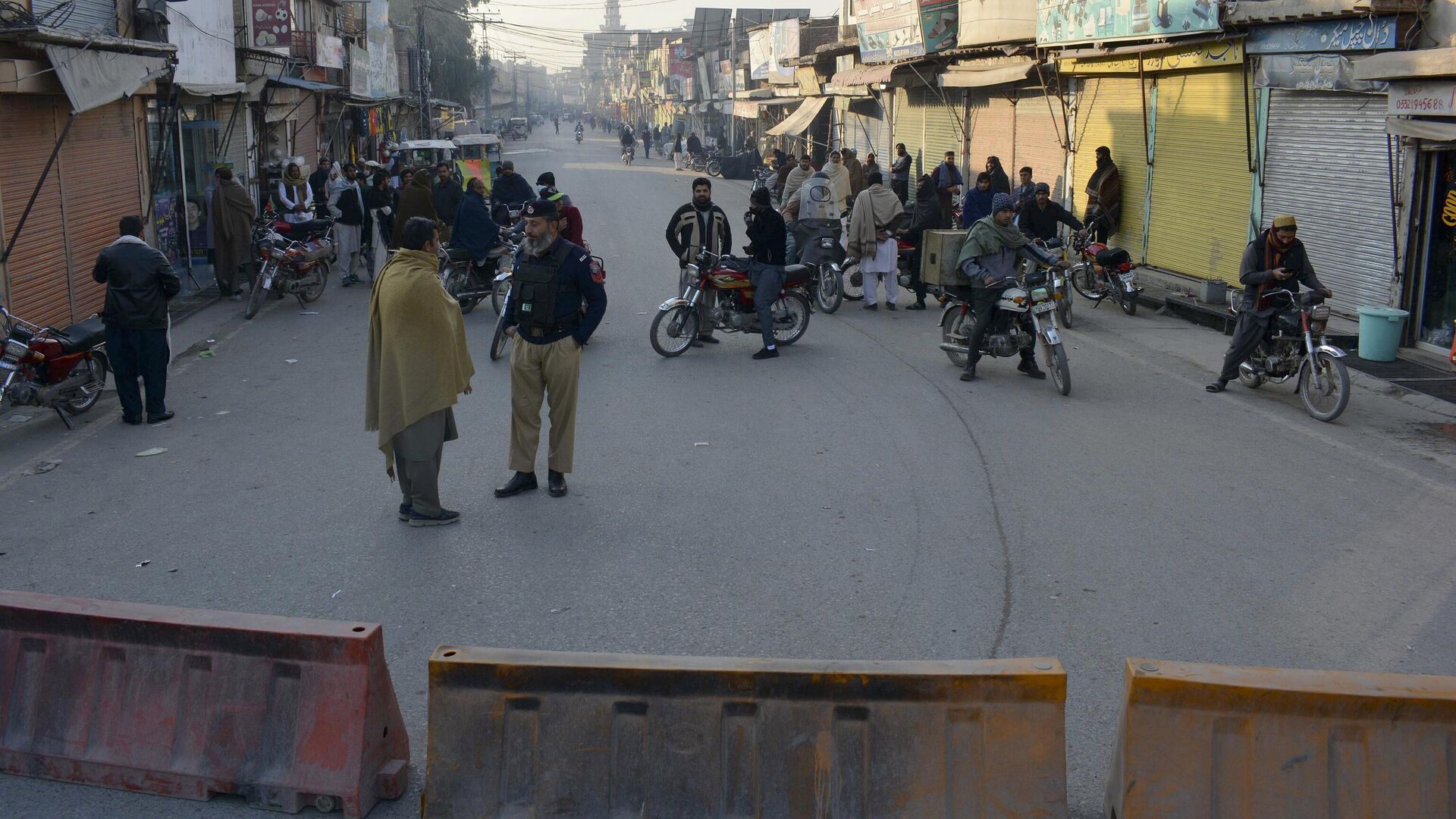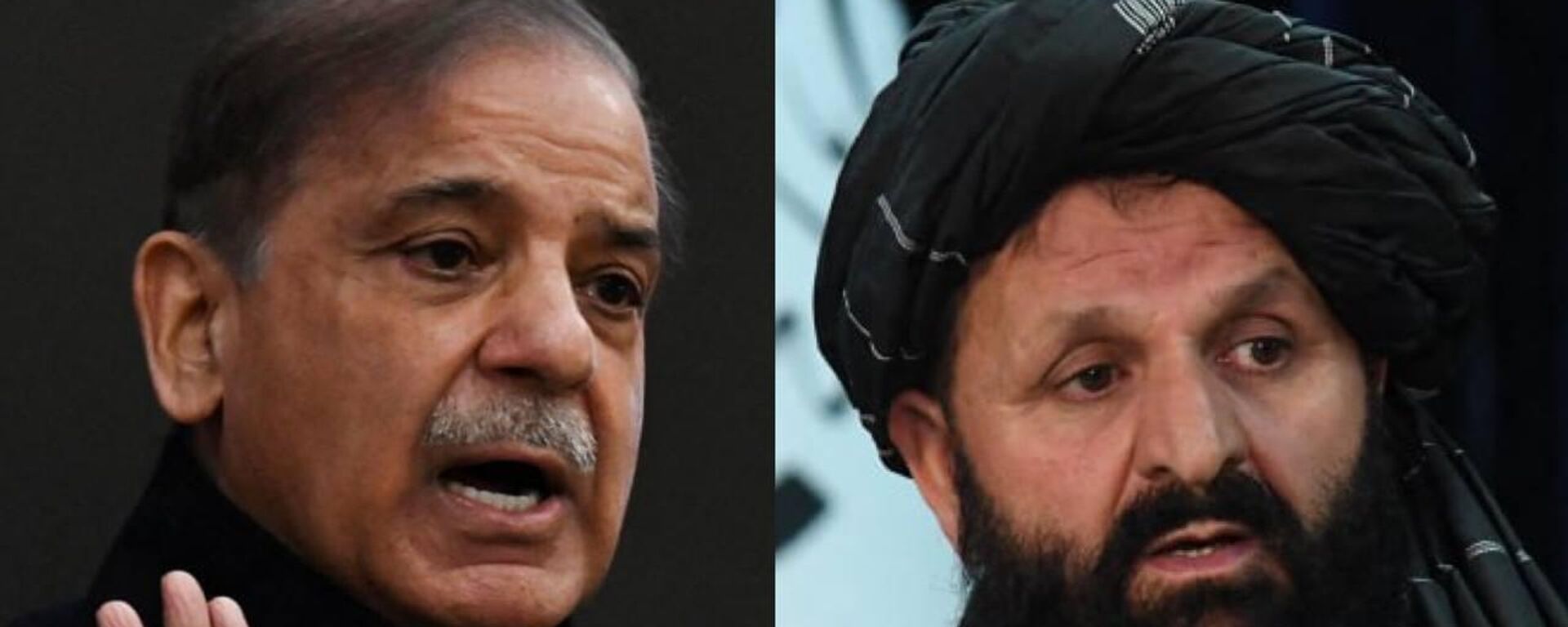https://sputniknews.in/20240723/pakistani-taliban-enjoys-safe-havens-in-border-regions-infiltration-continues-7888560.html
Pakistani Taliban Enjoys Safe Havens in Border Regions, Infiltration Continues
Pakistani Taliban Enjoys Safe Havens in Border Regions, Infiltration Continues
Sputnik India
Pakistan faces significant challenges in its fight against the TTP, both in Pakistan and across the border in Afghanistan, an Islamabad-based geopolitical commentator has said.
2024-07-23T19:56+0530
2024-07-23T19:56+0530
2024-07-23T19:56+0530
sputnik opinion
taliban
tehreek-e-taliban pakistan (ttp)
afghanistan
kabul
islamabad
terror outfits
cross-border terrorism
counter-terrorism
terrorism
https://cdn1.img.sputniknews.in/img/07e6/0c/14/164671_0:160:3073:1888_1920x0_80_0_0_16c498e785892081a1eed3e49e3e8db3.jpg
Pakistan faces significant challenges in its fight against the TTP, both in the country and across the border in Afghanistan, an Islamabad-based geopolitical commentator has told Sputnik India.The Taliban has long been under pressure from the Pakistani government to take serious action against not just the TTP, but the Baloch Liberation Army (BLA*) and Islamic State Khorasan Province (ISKP*) as well, according to Syed Khalid Muhammad, the Executive Director of CommandEleven, a Pakistani national security think tank.However, the Taliban authorities continue to deny they have any presence on their side of the border, which is interesting because they continue to lobby Qatar, China, and Pakistan for funds to re-settle the TTP from the border regions into other provinces in Afghanistan, the think tanker suggested.In the meantime, on Pakistan's side of the border, the TTP has achieved significant infiltration, and continues to infiltrate, in Khyber Pakhtunkhwa (KP), established training camps and safe havens in FATA, Swat, Dir, DI Khan, and Buner, where they are regularly launching attacks against Pakistan's security forces, he stated.However, the problem Pakistan faces in fighting the group is with the local population, who provide shelter, food, and support to them in mosques and their homes, Khalid Muhammad highlighted.On Monday, the Pakistan military said that the security forces were conducting over 112 missions against terror outfits daily as part of the military operation "Azm-e-Istehkam". The campaign launched by the country in June was a targeted operation in Khyber Pakhtunkhwa and Balochistan against terrorists and insurgents in both provinces who are attacking Pakistan and/or Chinese assets in the country, Khalid Muhammad reckoned.Meanwhile, since the terrorists do not threaten the civilian population, it will not support an operation in their areas because they will become a target of the terrorists once the military starts an operation there, he emphasised.Can Diplomacy Break the Ice Between Kabul & Islamabad?Diplomacy would not be able to break the ice between the two governments, while Taliban is denying exist of terror camps in Afghanistan and the fact that they are arming these groups, Khalid Muhammad said. Additionally, Taliban refusing to take any action against the 21 terror groups that are openly operational inside Afghanistan, they are openly telling the world that there is no al-Qaeda*, East Turkestan Islamic Movement (ETIM*), Islamic Movement of Uzbekistan (IMU*), ISKP, and TTP on Afghan soil targeting foreign countries, he added.Moreover, diplomacy has been tried multiple times over the past 3 years, using military, government, and religious leaders to help the Taliban government understand that the existing threat in their country is not only dangerous for Pakistan but for Afghanistan and its citizens as well, he stated. Besides, countries, like Russia, Iran, and China, have also raised the security issue in the region, according to the expert.* internationally banned oranisations
https://sputniknews.in/20240722/from-allies-to-adversaries-the-evolving-dynamics-of-ttp-taliban-and-pakistan-7881374.html
afghanistan
kabul
islamabad
Sputnik India
feedback.hindi@sputniknews.com
+74956456601
MIA „Rossiya Segodnya“
2024
Pawan Atri
https://cdn1.img.sputniknews.in/img/07e6/0c/13/139630_147:0:831:684_100x100_80_0_0_8fa2b25903e7787fe6a2698552c167df.png
Pawan Atri
https://cdn1.img.sputniknews.in/img/07e6/0c/13/139630_147:0:831:684_100x100_80_0_0_8fa2b25903e7787fe6a2698552c167df.png
News
en_IN
Sputnik India
feedback.hindi@sputniknews.com
+74956456601
MIA „Rossiya Segodnya“
Sputnik India
feedback.hindi@sputniknews.com
+74956456601
MIA „Rossiya Segodnya“
Pawan Atri
https://cdn1.img.sputniknews.in/img/07e6/0c/13/139630_147:0:831:684_100x100_80_0_0_8fa2b25903e7787fe6a2698552c167df.png
operation azm-e-istehkam, azm-e-istehkam, operation azm-e-istehkam pakistan army, azm-e-istehkam pakistan army, pakistan army operation azm-e-istehkam, pakistan army counter-terrorism operation, operation azm-e-istehkam ispr, operation azm-e-istehkam inter-services public relations, lieutenant general ahmed sharif, azm-e-istehkam ttp, operation azm-e-istehkam ttp,
operation azm-e-istehkam, azm-e-istehkam, operation azm-e-istehkam pakistan army, azm-e-istehkam pakistan army, pakistan army operation azm-e-istehkam, pakistan army counter-terrorism operation, operation azm-e-istehkam ispr, operation azm-e-istehkam inter-services public relations, lieutenant general ahmed sharif, azm-e-istehkam ttp, operation azm-e-istehkam ttp,
Pakistani Taliban Enjoys Safe Havens in Border Regions, Infiltration Continues
For months, Pakistan has been rocked by a wave of terrorist attacks, which Islamabad has repeatedly blamed on the outlawed Tehreek-e-Taliban Pakistan (TTP*) members residing in Afghanistan of carrying out. Sputnik India examines the challenges faced by the country's security forces in taking on the terrorist group.
Pakistan faces significant challenges in its fight against the TTP, both in the country and across the border in Afghanistan, an Islamabad-based geopolitical commentator has told Sputnik India.
The Taliban has long been under pressure from the Pakistani government to take serious action against not just the TTP, but the Baloch Liberation Army (BLA*) and Islamic State Khorasan Province (ISKP*) as well, according to Syed Khalid Muhammad, the Executive Director of CommandEleven, a Pakistani national security think tank.
However, the Taliban authorities continue to deny they
have any presence on their side of the border, which is interesting because they continue to lobby Qatar, China, and Pakistan for funds to re-settle the TTP from the border regions into other provinces in Afghanistan, the think tanker suggested.
"I believe it was last month that Pakistan received intelligence that the Taliban was building a sizeable residential and training complex for the TTP in Ghazni province [Afghanistan]. On the one hand, Taliban say there is no presence there; on the other hand, they are building residential and training complexes. It makes it difficult to believe they are truly looking for a peaceful Afghanistan and a peaceful region when intelligence like this is made public," Khalid Muhammad told Sputnik India on Tuesday.
In the meantime, on Pakistan's side of the border, the TTP has achieved significant infiltration, and continues to infiltrate, in
Khyber Pakhtunkhwa (KP), established training camps and
safe havens in FATA, Swat, Dir, DI Khan, and Buner, where they are
regularly launching attacks against Pakistan's security forces, he stated.
However, the problem Pakistan faces in fighting the group is with the local population, who provide shelter, food, and support to them in mosques and their homes, Khalid Muhammad highlighted.
"This makes any kind of operation against them more difficult due to the potential collateral damage and civilian loss of life that will become propaganda material for them to use for recruiting more fighters," he added.
On Monday, the Pakistan military said that the security forces were conducting over 112 missions against terror outfits daily as part of the military operation
"Azm-e-Istehkam". The campaign launched by the country in June was a targeted operation in Khyber Pakhtunkhwa and Balochistan against terrorists and
insurgents in both provinces who are attacking Pakistan and/or Chinese assets in the country, Khalid Muhammad reckoned.
Meanwhile, since the terrorists do not threaten the civilian population, it will not support an operation in their areas because they will become a target of the terrorists once the military starts an operation there, he emphasised.
"We saw evidence of that fact in the recent attack on the Bannu cantonment, where the peace jirga [a tribal council] clearly listed in their demands that they would not allow the operation to be carried out in their area, mostly in fear of reprisals from the terrorists, as Noor Wali Mehsud [TTP chief] has openly announced anyone working with the government or supporting the military in this operation will be a target," Khalid Muhammad explained.
Can Diplomacy Break the Ice Between Kabul & Islamabad?
Diplomacy would not be able to break the ice between the two governments, while Taliban is denying exist of terror camps in Afghanistan and the fact that they are arming these groups, Khalid Muhammad said. Additionally, Taliban refusing to take any action against the 21 terror groups that
are openly operational inside Afghanistan, they are openly telling the world that there is no
al-Qaeda*,
East Turkestan Islamic Movement (ETIM*),
Islamic Movement of Uzbekistan (IMU*), ISKP, and TTP on Afghan soil targeting foreign countries, he added.
Moreover, diplomacy has been tried multiple times over the past 3 years, using military, government, and religious leaders to help the Taliban government understand that the existing threat in their country is not only dangerous for Pakistan but for Afghanistan and its citizens as well, he stated. Besides, countries, like Russia, Iran, and China, have also raised the security issue in the region, according to the expert.
"Diplomacy will only work when both sides accept their roles in the conflict. Pakistan and China are ready to help Afghanistan eliminate the terror camps." Khalid Muhammad concluded.
* internationally banned oranisations



